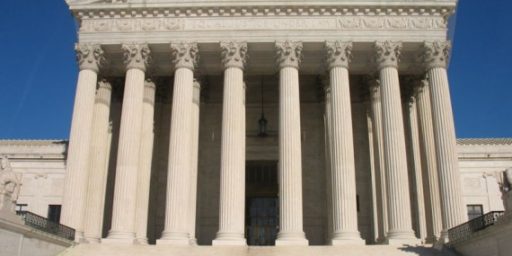CONSTITUTIONAL INTERPETATION
In a July 4 post I missed, Steven Taylor reflects on the changing meaning of the Declaration of Independence, ending with
I realized sometime back that while I favor a constructionist view of constitutional interpretation, that I do see the need to allow for some level of linguistic and attitudinal evolution in such interpretations. For example, while it was clearly not the intent of the authors of the 14th Amendment to include gender in the Equal Protection Clause, I think that it should be understood to do exactly that, given the evolution of our attitudes towards citizenship. I do not see this as a judicial activism approach, but one which takes the plain meaning of the words of the text, even if that plain meaning has changed over time.
I’d say “it depends.” For example, I think it’s perfectly reasonable to include, say, Internet sales within the definition of interstate commerce even though the Framers obviously never thought of that. But to include women in the 14th Amendment–and, presumably, homosexuals and others down the road–is a slippery slope.
If attitudes evolve, presumably this will be reflected in legislation passed by the representatives of the people. Nothing in the 14th Amendment precludes women being treated exactly like men, but it clearly wasn’t intended to mandate that (witness the failure to pass the Equal Rights Amendment as recently as 1982).
While we have largely created male-female equality legislatively as technology and attitudes have changed, we still think of men and women differently, most obviously in terms of combat duty but also in more trivial things like car insurance rates. Courts shouldn’t mandate equality here. Ditto the status of homosexuals qua homosexuals in the law. I’m okay with gay marriage but think it should happen by legislation rather than judicial fiat.
Update (10:01): Steven brings up a good point in the comments that “it depends” is flexible, which it of course is. I think that deference to the legislature is the way to go in these matters, since it is they who are accountable to the people. If Congress passes legislation regulating commerce, and it’s reasonable to conclude that they’re simply acting within an “updated” view of their delegated power, then the courts should allow it. Any “stretching” of the Constitution should be done by the legislature, with the courts reigning them in from going overboard rather than the courts striking down legislation based on their own expansion of the constitutional language. I’m much more likely to cry “judicial activism” when courts make up new rights than when they allow the elected branches to make judments.





Of course, part of the argument by some for not ratifying the ERA was that the 14th Amendment already provided sufficient equal protection.
Further, the “it depends” argument still requires a great deal of interpretation, so no matter which way one goes, truly strict interpretation is impossible.
—